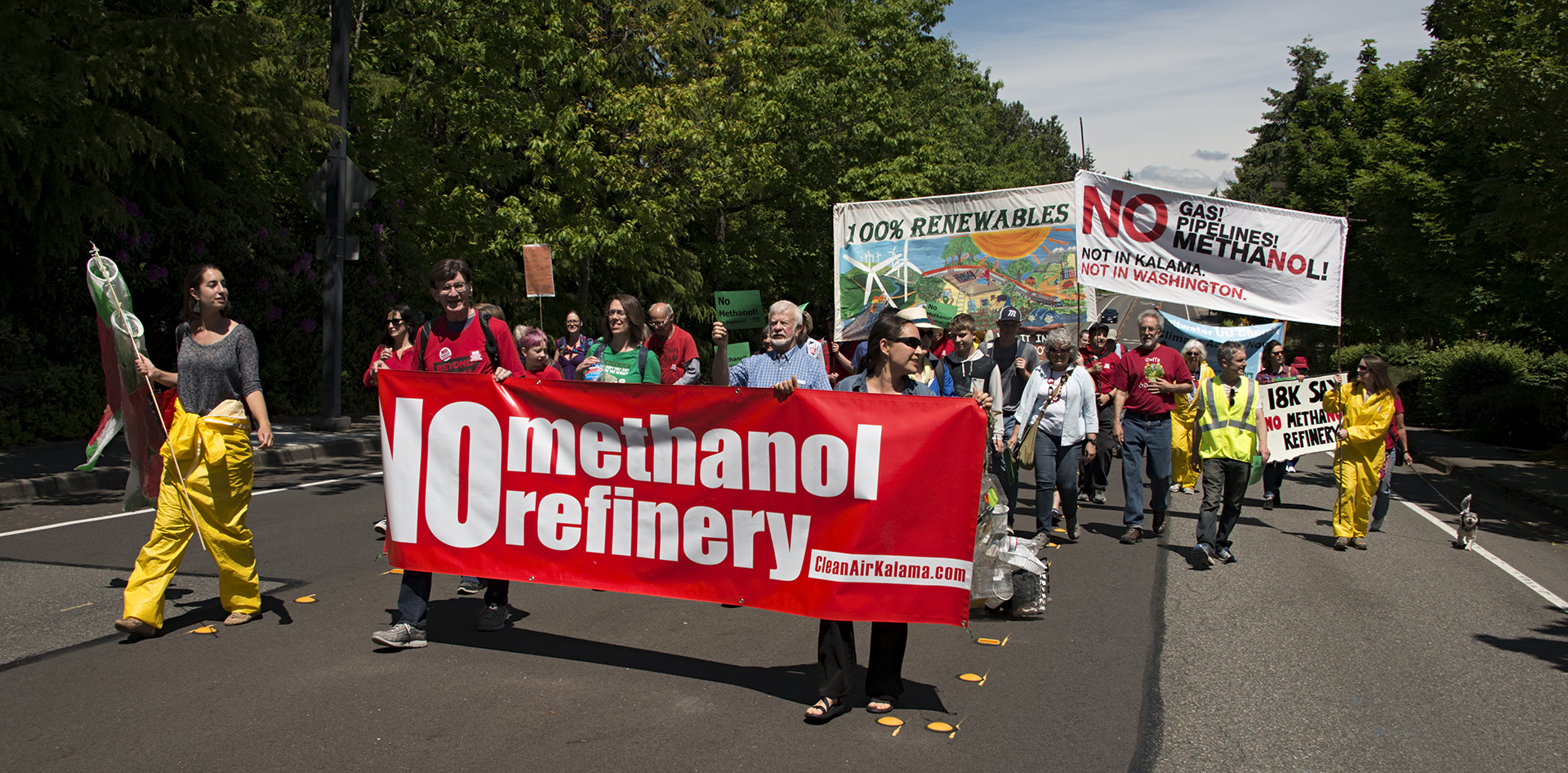
Northwest Innovation Works wants to build the world’s largest fracked-gas-to-methanol refinery in Kalama, Washington. The project would take fracked gas, refine it to methanol (a highly flammable form of liquid, refined, fracked gas) in Kalama, and then ship it to China to either manufacture plastics or be used as fuel. If this facility were built, it would exponentially increase Washington’s greenhouse gas emissions, threaten communities of color and low-income communities, and pollute the surrounding environment.
Two-thirds of “natural” gas in the US is fracked. Fracking is a dirty and environmentally-hazardous extraction process that emits a pollutant called methane--one of the most potent greenhouse gases. When properly accounting for methane leaks, fracked gas has climate impacts that rival that of coal. The world’s largest fracked gas to methanol refinery, proposed in Southwest Washington would consume more gas than any sector of Washington’s economy, making the refinery Washington’s largest climate polluter by 2025.
According to the Sierra Club’s independent study, this refinery would emit a staggering 12 million metric tons of greenhouse gases per year, equivalent to 2.4 million cars. This would increase our state’s contribution to global warming by nearly 20%. In addition, up to 6 tankers per month would transport tankers of methanol to China, adding to the total greenhouse gas emissions of maintaining this facility.
The refinery would also drastically increase our state’s contribution to the climate crisis by rationalizing new pipeline construction and opening the floodgates for fracked gas transportation and usage. The Kalama methanol project would consume far more fracked gas than the region’s biggest cities combined. Due to its enormous demand for gas, operating this refinery will require an increase in the region’s gas pipeline capacity. A new gas pipeline could be built along the Columbia River Gorge to bring fracked gas from the center of the country, or down the 1-5 corridor to bring gas from Canada. Building a new gas pipeline will rationalize more gas infrastructure and export projects, each of which will have dire environmental, climate and human health consequences. These projects tend to be proposed in communities of color neighborhoods and low-income communities like Kalama.
Methanol is extremely flammable. In current plans, the methanol from the Kalama refinery would be stored on dredged sand with a moderate to high risk of liquifying in an earthquake. All of downtown Kalama and three schools are in the glass-shattering blast zone. In addition, both daily maintenance and any potential leak would have disastrous effects on the nearby ecosystems. The refinery would use 5 million gallons of water every day. Methanol spills deplete the water of oxygen, potentially creating a dead zone beneath the spill- endangering our salmon, and therefore our orca populations.
The Sierra Club has been working with coalition partners and local community members to stop this project since 2016. In that time, we have significantly delayed the project, convinced Governor Inslee to publicly oppose fracked gas, and ensured accurate environmental impact reporting through the Washington State Department of Ecology.
Current status:
The Department of Ecology is conducting a public comment period for a key permit needed to build this refinery- the Shorelines permit. We are counting on the Department of Ecology to safeguard our safety, our health, and our climate by denying this project once and for all! The public can submit comments between August 17th and September 17th, and attend the virtual public hearing (date TBD).
Get Involved:
(Select "Stopping Fossil Fuels" and mention "Kalama Methanol campaign" to get involved)
Upcoming Events:
No Methanol Tuesday- Texting and LTEs
(Tue, Sep 8, 2020 6:00 PM - 7:30 PM)
RSVP HERE
Join us in engaging the public in the official comment period to stop the world's largest fracked gas to methanol refinery! Every Tuesday during the comment period, starting on September 8, 2020, we will engage in actions to stop this dirty and dangerous project.
This event will be the first No Methanol Tuesday action. We will be texting folks who have expressed opposition to this refinery across the region and asking them to submit a comment to the department of ecology.
Our texting program is Hustle, and requires participants to download an app to a smartphone. This webinar will include training on how to do this. For folks who are unable to use the app, we will have a breakout group where you can write Letters to the Editor instead. Please answer the additional questions when you RSVP about your comfort level using Hustle, and if you want to write letters to the editor instead.








